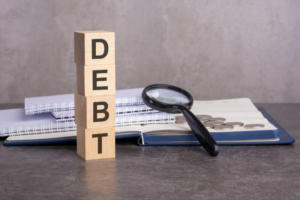
How Much Debt is Too Much in Canada?
How much debt is too much? This question can cause a lot of worry, especially with Canada’s rising cost of living. In this article, we’ll walk you through the process of understanding and managing debt in a way that’s straightforward and easy to grasp.
Can I Do Without Debt?
It’s almost impossible to live entirely debt-free. We often need to borrow money to make significant purchases, like buying a home, a car, or paying for higher education. Sometimes, emergencies can also lead us into unexpected debt. While these can be legitimate reasons to borrow, debt can easily pile up, leading to a tricky financial situation.
So, How Much is Too Much Debt?
The answer can vary depending on several factors. But one easy way to assess whether you have too much debt is by using something called the Debt-to-Income Ratio.
This ratio is between your monthly debt payments to your net monthly income. To calculate it, you divide all your monthly debt payments by your gross monthly income. The result will be multiplied by 100 to get a percentage.
If this percentage is 36% or lower, it indicates a healthy debt load. Consider reducing your debt levels if it’s between 37% and 42%. Above 43%, and you are in the danger zone, where it becomes challenging to meet other living costs or save for the future.
Understanding Different Types of Debts

All debts are not created equal. Some debts can help you build a positive credit history and increase your net worth. Others, known as bad debts, can drag you into a financial pithole. Understanding the difference is crucial.
- Good Debts: These are investments that create value and can increase your wealth over time. Examples include a mortgage, student loans, or business loans.
- Bad Debts: These are typically associated with assets that quickly depreciate in value or don’t generate any income. Examples include credit card debts, payday loans, and car loans.
The Effect of Carrying Too Much Debt
Carrying too much debt can have far-reaching consequences. Financial stress can take a toll on your physical and mental health, straining relationships and impacting your quality of life.
Overburdening debt can limit your financial freedom, making it difficult to save for retirement, invest for future gains, or even just maintain a comfortable lifestyle. It also affects your credit score negatively, making it harder to secure loans or get favorable interest rates in the future.
Signs You Have Too Much Debt
If you’re still unsure whether you have too much debt, watch for these signs:
- Minimum Payments: If you’re only making minimum payments on your credit cards, it might indicate that you have more debt than you can handle.
- Sacrificing Necessities: If you’re constantly struggling to pay for basic necessities because you have to service your debts, it’s a clear sign that you’re carrying too much debt.
- Losing Sleep: If worries about debt is causing you to lose sleep, it’s a strong indicator that your debt is at an unhealthy level.
- Ignoring the Problem: If you’re avoiding opening your bills or facing your financial situation, it’s a tell-tale sign of too much debt.
Strategies to Reduce Your Debt
Here are some strategies to reduce your debt:
- Debt Consolidation: This involves combining all your debts into one. The benefit here is that you only have to worry about one payment, and the interest rate is often lower.
- Debt Settlement: In some cases, you can negotiate with your creditors to pay a smaller amount than what you owe.
- Increase Your Income: Look for ways to increase your income. It could be by getting a part-time job, selling items you don’t need, or turning a hobby into a side business.
Keeping Your Debt in Check
To manage your debt effectively, here are a few tips:
- Create a Budget: Understanding where your money is going can help you make informed decisions about spending and saving.
- Pay Off High-Interest Debt First: These debts cost you the most, so prioritize paying them down.
- Build an Emergency Fund: It can help you handle unexpected expenses without needing to borrow.
- Seek Professional Help: If you’re struggling with managing your debt, consult with a debt expert.
Getting Help with Your Debt

If you’re in a situation where your debt seems unmanageable, remember that help is available. Organizations like EmpireOne Credit provide counselling services to help manage and reduce your debt.
Dealing with debt can be challenging, but it’s not something you have to do alone. Reach out to a debt expert at EmpireOne Credit. We can help you devise a plan tailored to your specific needs, helping you step confidently towards a debt-free future. Your debt could be reduced by up to 80%, and all interest will stop immediately. Contact us at (416) 900-2324 to schedule a free consultation. Being debt-free feels good!





